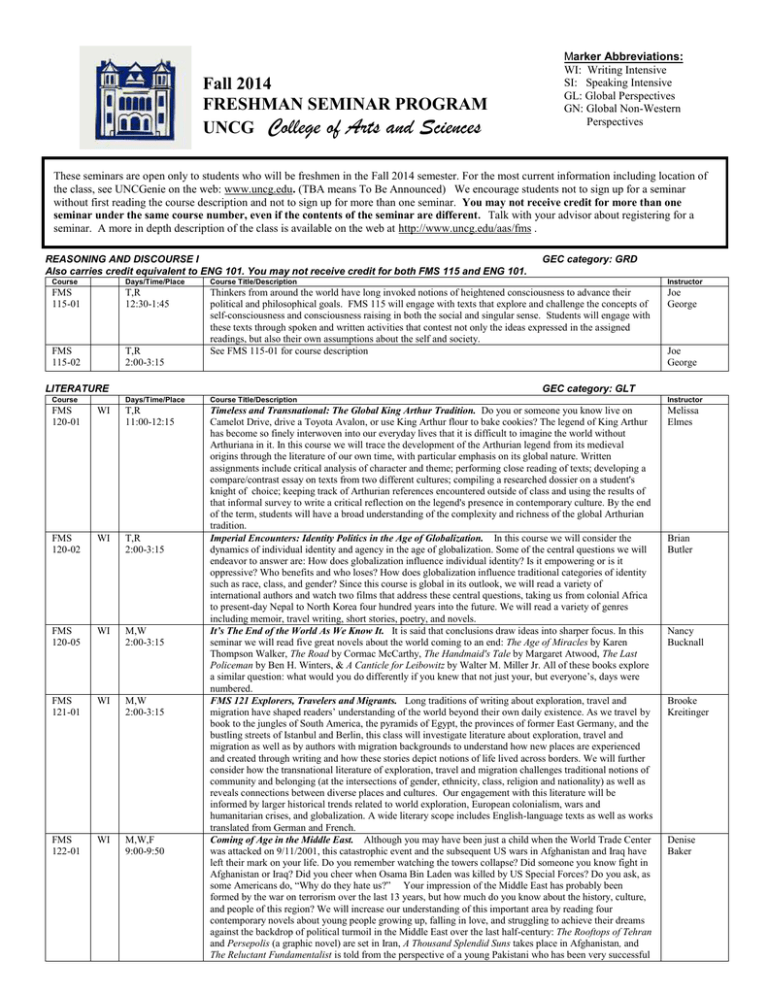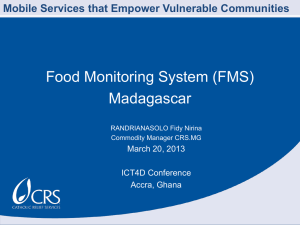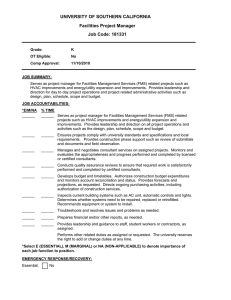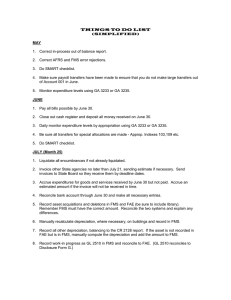Booklet FMS Fall 2014
advertisement

Fall 2014 FRESHMAN SEMINAR PROGRAM UNCG College of Arts and Sciences Marker Abbreviations: WI: Writing Intensive SI: Speaking Intensive GL: Global Perspectives GN: Global Non-Western Perspectives These seminars are open only to students who will be freshmen in the Fall 2014 semester. For the most current information including location of the class, see UNCGenie on the web: www.uncg.edu. (TBA means To Be Announced) We encourage students not to sign up for a seminar without first reading the course description and not to sign up for more than one seminar. You may not receive credit for more than one seminar under the same course number, even if the contents of the seminar are different . Talk with your advisor about registering for a seminar. A more in depth description of the class is available on the web at http://www.uncg.edu/aas/fms . REASONING AND DISCOURSE I Also carries credit equivalent to ENG 101. You may not receive credit for both FMS 115 and ENG 101. GEC category: GRD Course Days/Time/Place Course Title/Description Instructor FMS 115-01 T,R 12:30-1:45 Joe George FMS 115-02 T,R 2:00-3:15 Thinkers from around the world have long invoked notions of heightened consciousness to advance their political and philosophical goals. FMS 115 will engage with texts that explore and challenge the concepts of self-consciousness and consciousness raising in both the social and singular sense. Students will engage with these texts through spoken and written activities that contest not only the ideas expressed in the assigned readings, but also their own assumptions about the self and society. See FMS 115-01 for course description LITERATURE Course Joe George GEC category: GLT Days/Time/Place Course Title/Description Instructor Timeless and Transnational: The Global King Arthur Tradition. Do you or someone you know live on Camelot Drive, drive a Toyota Avalon, or use King Arthur flour to bake cookies? The legend of King Arthur has become so finely interwoven into our everyday lives that it is difficult to imagine the world without Arthuriana in it. In this course we will trace the development of the Arthurian legend from its medieval origins through the literature of our own time, with particular emphasis on its global nature. Written assignments include critical analysis of character and theme; performing close reading of texts; developing a compare/contrast essay on texts from two different cultures; compiling a researched dossier on a student's knight of choice; keeping track of Arthurian references encountered outside of class and using the results of that informal survey to write a critical reflection on the legend's presence in contemporary culture. By the end of the term, students will have a broad understanding of the complexity and richness of the global Arthurian tradition. Imperial Encounters: Identity Politics in the Age of Globalization. In this course we will consider the dynamics of individual identity and agency in the age of globalization. Some of the central questions we will endeavor to answer are: How does globalization influence individual identity? Is it empowering or is it oppressive? Who benefits and who loses? How does globalization influence traditional categories of identity such as race, class, and gender? Since this course is global in its outlook, we will read a variety of international authors and watch two films that address these central questions, taking us from colonial Africa to present-day Nepal to North Korea four hundred years into the future. We will read a variety of genres including memoir, travel writing, short stories, poetry, and novels. It’s The End of the World As We Know It. It is said that conclusions draw ideas into sharper focus. In this seminar we will read five great novels about the world coming to an end: The Age of Miracles by Karen Thompson Walker, The Road by Cormac McCarthy, The Handmaid's Tale by Margaret Atwood, The Last Policeman by Ben H. Winters, & A Canticle for Leibowitz by Walter M. Miller Jr. All of these books explore a similar question: what would you do differently if you knew that not just your, but everyone’s, days were numbered. FMS 121 Explorers, Travelers and Migrants. Long traditions of writing about exploration, travel and migration have shaped readers’ understanding of the world beyond their own daily existence. As we travel by book to the jungles of South America, the pyramids of Egypt, the provinces of former East Germany, and the bustling streets of Istanbul and Berlin, this class will investigate literature about exploration, travel and migration as well as by authors with migration backgrounds to understand how new places are experienced and created through writing and how these stories depict notions of life lived across borders. We will further consider how the transnational literature of exploration, travel and migration challenges traditional notions of community and belonging (at the intersections of gender, ethnicity, class, religion and nationality) as well as reveals connections between diverse places and cultures. Our engagement with this literature will be informed by larger historical trends related to world exploration, European colonialism, wars and humanitarian crises, and globalization. A wide literary scope includes English-language texts as well as works translated from German and French. Coming of Age in the Middle East. Although you may have been just a child when the World Trade Center was attacked on 9/11/2001, this catastrophic event and the subsequent US wars in Afghanistan and Iraq have left their mark on your life. Do you remember watching the towers collapse? Did someone you know fight in Afghanistan or Iraq? Did you cheer when Osama Bin Laden was killed by US Special Forces? Do you ask, as some Americans do, “Why do they hate us?” Your impression of the Middle East has probably been formed by the war on terrorism over the last 13 years, but how much do you know about the history, culture, and people of this region? We will increase our understanding of this important area by reading four contemporary novels about young people growing up, falling in love, and struggling to achieve their dreams against the backdrop of political turmoil in the Middle East over the last half-century: The Rooftops of Tehran and Persepolis (a graphic novel) are set in Iran, A Thousand Splendid Suns takes place in Afghanistan, and The Reluctant Fundamentalist is told from the perspective of a young Pakistani who has been very successful Melissa Elmes FMS 120-01 WI T,R 11:00-12:15 FMS 120-02 WI T,R 2:00-3:15 FMS 120-05 WI M,W 2:00-3:15 FMS 121-01 WI M,W 2:00-3:15 FMS 122-01 WI M,W,F 9:00-9:50 Brian Butler Nancy Bucknall Brooke Kreitinger Denise Baker in America but returns to his native country after 9/11. We will also view films based on some of these novels or about the history of these countries. By studying this literature, you will gain insight into the ambivalent attitude toward the United States that many young people in the Middle East hold. Through such an intellectual and imaginative experience, you will become better engaged in the global community of your future. FINE ARTS Course GEC category: GFA Days/Time/Place Course Title/Description Instructor M,W 3:30-4:45 M, W, F 10:00-10:50 All the Art News That's Fit to Print. Explore the exciting world of art through reading, writing and analyzing current art issues such as conservation, theft, ownership, and censorship. Acting Change in America: Human Rights Onstage. In this course we will look at the rich legacy of American plays that have, at their center, the struggle for equality in a chaotic world. These dramas reflect the nation’s political, social, and moral norms which have been in constant flux in the tumultuous 20th century and they bring into sharp focus the troubling prejudices and conformities that have influenced and sometimes dominated our culture. Italian Zombies, French Cannibals, and Japanese Ghosts: The Globalization of the Extreme Horror Film. American blockbusters like Ironman, Gravity, Spiderman, and The Hobbit have colonized the global film market for years. Less understood is the fact that extreme horror films from Italy, France, Japan, Thailand, and elsewhere have also become a global phenomenon. So popular have these films become that Hollywood has invested in expensive, star-cast remakes, often with their original directors, and, in one case, an awardwinning cable series (The Walking Dead). This course will examine ten original extreme horror films from their country of origin, together with four American remakes, in an attempt to determine what it is about this genre that has made it so internationally successful, despite the fact that the films themselves often have low production values and (literally) distasteful subjects. History and Art of Animation. Animation is an art form that brings fanciful imaginings to vivid realization. As a popular form of entertainment for children and adults, animation captivates our imagination and influences our way of perceiving the world. In this class we will look at the historical progression of animation techniques, the social characterizations presented in popular cartoons, and the artistic brilliance of animators from around the world. Jennifer Reich Jeff West FMS 130-01 FMS 130-02 WI FMS 131-01 WI T,R 5:00-6:15 FMS 131-02 WI T,R 11:00-12:15 WI PHILOSOPHICAL, RELIGIOUS, AND ETHICAL PRINCIPLES Course FMS 142-01 WI, WGS FMS 151-01 WI Instructor T, R 12:30-1:45 Women in Judaism. This course explores the role of women in Judaism. Topics include 1) women in Jewish literature, 2) Judaism's understanding of marriage, women's sexuality, and reproductive rights, 3) women's roles in Judaism, and 4) the modern Jewish women's movement. Class will focus on close readings and group discussions, as well as on developing critical thinking, speaking, and writing skills useful in a variety of college settings. Readings will be drawn from traditional Jewish literature, modern Jewish women's writings, and current events. Ellen Haskell GEC/CAR category: GHP/GPM Days/Time/Place Course Title/Description Instructor M,W,F 11:00-11:50 You Don’t Belong! The ‘Other’ in Medieval Western Culture. Are we “in” or are we “out”? Various groups of people have asked this question throughout history. Lepers, heretics, prostitutes, Muslims, and Jews might have answered that they were “out” in medieval Europe. The historian R.I. Moore has argued that the high middle ages was the period of the “formation of a persecuting society” during which the majority (those who were “in”) willfully persecuted various minorities (those who were “out.”) Is his argument valid, both in its terms and in its dating? In this course, we will examine sources by and about those on the fringes of medieval society – sources including romances, poems, art, laws, and religious texts – to see if we can find evidence to support or reject Moore’s thesis. Through this process we will be able to see how and why medieval people defined various groups as “in” or “out” of the mainstream of western medieval Christendom… Restricted to students in the Communities in the Disciplines: Humanities learning community. Anne Barton GEC/CAR category: GHP/GMO Days/Time/Place Course Title/Description Instructor The Contemporary South. The South has always stood as a region apart in popular imagination. Southerners, so they say, have one speed—slow. We have our own language, sprinkled abundantly with y’alls, and we call everyone darlin’, hon, or sweetie. We drive pickup trucks, listen to country music, go to church on Sunday morning, and gather for pig pickin’s. We may be poor, but we know how to enjoy life. But the South of the twenty-first century is surprisingly modern and complex, with vibrant eclectic cities. In many ways, the stereotypes of the past no longer apply. This class challenges students to explore the Contemporary South with its new culture, new economy, new politics, and even new people. Welcome to today’s South! See FMS 160-02 for course description Susan Thomas FMS 160-02 WI TR 11:00-12:15 FMS 160-03 WI TR 12:30-1:45 SOCIAL AND BEHAVIORAL STUDIES Course GEC category: GPR Course Title/Description HISTORICAL PERSPECTIVES: Modern Course Eleanor Cowen Days/Time/Place HISTORICAL PERSPECTIVES: Pre-Modern Course David Cook Susan Thomas GEC category: GSB Days/Time/Place Course Title/Description Instructor Creating and Communicating the Self. How do you know who you are? How do others know who you are? We'll be exploring the ways we create, interpret, and share our identities through discourse, nonverbal, and mediated communication. Do we create ourselves as members of society or does society create us? Could both be true? We will examine theoretical perspectives on human identity, focusing on communicative processes. War and Conflict. It has been estimated that there has been a war somewhere in the world 94% of the time since the dawn of civilization. Why does mankind periodically organize himself for armed conflict and warfare? This course will begin by asking these questions and try to answer them through an examination of the United States’ involvement in war and conflict over the last hundred years. Fans, Athletes, and Sports in Modern Society. This course investigates the place of sport in society with a special emphasis on identity. Social identities are clearly an important factor in how a person understands his or her sense of self and place in society—and identities formed in and around the issue of sport are becoming increasingly important in late modern societies globally. As such we’ll be looking at how these identities are Jessica Digh FMS 170-01 WI T,R 11:00-12:15 FMS 170-02 WI T, R 9:30-10:45 FMS 170-03 WI M,W,F 12:00-12:50 A. Leigh Sink Steve O’Boyle achieved and disengaged for both athletes and fans. Central to this discussion will be issues of race, gender, and sexual orientation



